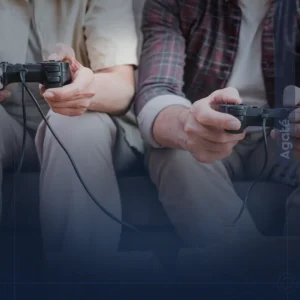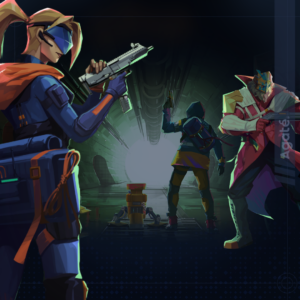The internet has undergone a significant transformation over the years. We’ve gone from simple static web pages to dynamic and interactive websites, social media, and e-commerce platforms. Now, we’re witnessing a new phase of the internet’s evolution known as Web3. It aims to create a more open and decentralized online environment, offering new possibilities in various industries, including the opportunity for Web3 game development.
This new phase is a shift away from the centralized control of Web2 and towards a more user-centric, democratic Internet. Web3 promises to deliver a more secure and transparent online experience where users have greater control over their data and identities. As the decentralized web continues to evolve, it will likely transform how we interact with the internet and the digital world around us. It’s a technology that promises to revolutionize many industries. It can conduct business and exchange value online and also offer new possibilities in the gaming industry with Web3 game development.
Web3 Game Development
Web3 game development has the potential to bring exciting changes to the gaming industry. Developers can use blockchain platforms to create games with transparent and secure ownership of in-game items, decentralized marketplaces, and player-driven economies. Web3 games can offer players unique experiences, such as actual ownership of virtual assets, verifiable scarcity of in-game items, and the ability to use those assets across different games. The adoption of Web3 in game development has the potential to create decentralized games that allow for peer-to-peer interactions between players, enabling a more social and collaborative gaming experience. Let’s check out some key features of Web3 game development that differentiate it from traditional games:
Decentralization
Web3 games are decentralized, meaning they operate on a blockchain rather than a central server. This ensures that no single entity has control over the game and that all transactions and interactions are transparent and secure. Decentralization also enables greater privacy for players, as they can be assured that their personal data is not being controlled or monitored by a central authority.
Ownership and Control
In Web3 games, players have greater ownership and control over their in-game assets, such as characters, items, and currency. This is because these assets are stored on the blockchain and can be traded, sold, or used outside the game. This creates a more equitable and transparent gaming economy, as players are no longer subject to the whims of a central authority or game developer.
Cryptocurrency Rewards
Players in the Web3 games are rewarded with cryptocurrency or non-fungible tokens (NFTs) for completing tasks or achieving milestones in the game. This creates a more sustainable and profitable model for game developers and players. Players can earn cryptocurrency and use it to purchase other in-game assets or even trade it on cryptocurrency exchanges for real-world currency.
Cross-platform Compatibility
With cross-device compatibility in mind, players can enjoy a seamless experience across various devices and platforms in the games. Transitions between devices can be made effortlessly without any loss of progress or in-game assets, ensuring a smooth and uninterrupted gaming experience. This is possible because the game data is stored on the blockchain rather than a central server. This creates a more seamless and convenient gaming experience for players, who can switch between devices without worrying about losing their progress or in-game assets.
Social and Collaborative Gameplay
By facilitating peer-to-peer interactions, these Web3 games foster a social and collaborative gaming experience among players. Players can connect with each other, engage in cooperative gameplay, and collaborate on various in-game activities, enhancing the sense of community and camaraderie within the gaming ecosystem. Players can work together to achieve goals in the game, form alliances, and even create their in-game economies. This makes a more engaging and immersive gaming experience, as players no longer play in isolation but are part of a larger community.
Transparency and Fairness
Web3 games are designed to be transparent and fair, with all transactions recorded on the blockchain. This guarantees all players equal access to in-game assets and rewards, promoting a more equitable gaming experience. Furthermore, incorporating smart contracts in Web3 games establishes predetermined rules and interactions that cannot be tampered with, adding a layer of assurance for fairness and transparency.
Web3 game development is poised to revolutionize the gaming industry by creating more engaging and equitable gaming experiences. By leveraging the power of decentralized networks, game developers can create more social, interactive, and rewarding games while giving players greater ownership and control over their gaming experiences. Web3 game development, being a novel technological advancement, presents various games that are equally engaging with traditional games. Here are some types of Web3 games:
Play-to-earn Games
In these cutting-edge games, players embark on exciting adventures and earn cryptocurrency or other valuable digital assets just by playing. Players can then buy, sell, or trade these digital assets on blockchain marketplaces, creating a bustling virtual economy right inside the game. It’s like having a thriving marketplace where players can become virtual entrepreneurs, making strategic moves and engaging in thrilling economic activities.
Collectible Games
These games use non-fungible tokens (NFTs) to create digital assets that players can collect, trade, and sell. NFTs represent ownership of unique virtual characters, rare items, and even virtual land. Like collecting rare trading cards or unique souvenirs, players can dive into a world of digital discovery and build their digital empire by buying, selling, and trading these unique assets on vibrant blockchain marketplaces.
Decentralized Autonomous Organization (DAO) Games
With the decentralized feature of Web3, players can participate in decentralized decision-making processes through blockchain platforms in DAO games. Players can vote on game development decisions, contribute to the game’s ecosystem, and collaboratively shape the game’s direction.
Future of Web3 Game Development
How will Web3 gaming change the future landscape of the industry? While Web3 game development has already introduced innovative gameplay mechanics and virtual economies, the technology itself is still in its early stages, promising even more advancements in the future. By leveraging the power of blockchain technology, Web3 games are revolutionizing how players interact with digital assets, providing unprecedented ownership, control, and earning opportunities.
As we look ahead to the future of web3 gaming, we can anticipate increased integration of blockchain technology, leading to exciting innovations in gameplay mechanics and virtual economies. Play-to-earn mechanics will likely gain more prominence, allowing players to earn valuable digital assets by simply playing games, which can be traded or utilized within the game or in the broader blockchain ecosystem. Moreover, we may see Decentralized Autonomous Organizations (DAOs) playing a more significant role in game development and governance, giving players a direct say in shaping the direction of the game and its ecosystem.
Advancements in virtual reality (VR) and augmented reality (AR) technologies are also expected to enhance the immersive experience of web3 games, unlocking new possibilities for virtual worlds and interactions. The combination of blockchain technology, play-to-earn mechanics, DAOs, and VR/AR technologies has the potential to create genuinely player-centric, decentralized, and immersive gaming experiences. The future of web3 gaming holds immense promise in transforming the gaming landscape.







